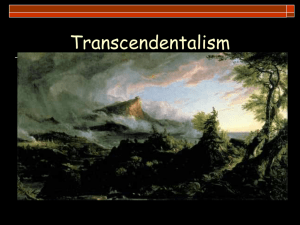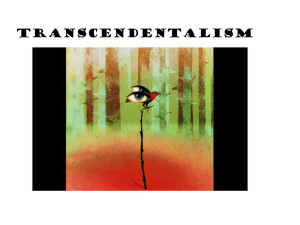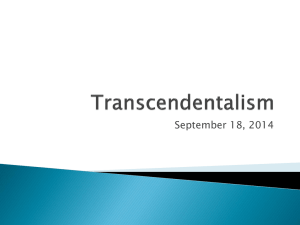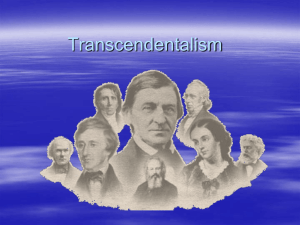Transcendentalism
advertisement
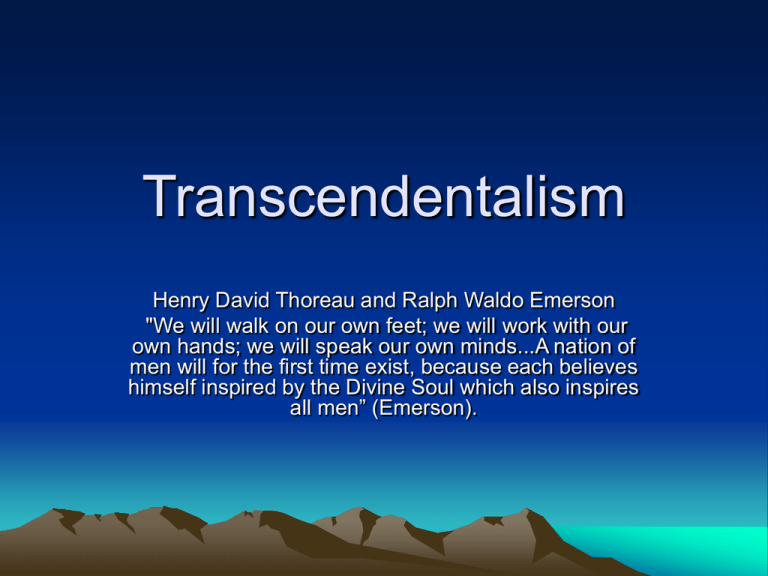
Transcendentalism Henry David Thoreau and Ralph Waldo Emerson "We will walk on our own feet; we will work with our own hands; we will speak our own minds...A nation of men will for the first time exist, because each believes himself inspired by the Divine Soul which also inspires all men” (Emerson). • "It is said to be the age of the first person singular" - Ralph Waldo Emerson • "Nothing at last is sacred but the integrity of your own mind." - Ralph Waldo Emerson, from Self-Reliance What is Transcendentalism? • “The Transcendentalists can be understood in one sense by their context -by what they were rebelling against, what they saw as the current situation and therefore as what they were trying to be different from” (Lewis). • What is Transcendentalism? • “One way to look at the Transcendentalists is to see them as a generation of well educated people who lived in the decades before the American Civil War and the national division that it both reflected and helped to create” (Lewis). What is Transcendentalism? • “These people, mostly New Englanders, mostly around Boston, were attempting to create a uniquely American body of literature. It was already decades since the Americans had won independence from England. Now, these people believed, it was time for literary independence. And so they deliberately went about creating literature, essays, novels, philosophy, poetry, and other writing that were clearly different from anything from England, France, Germany, or any other European nation..” (Lewis). What is Transcendentalism? • “Another way to look at the Transcendentalists is to see them as a generation of people struggling to define spirituality and religion (our words, not necessarily theirs) in a way that took into account the new understandings their age made available” (Lewis). • “The Enlightenment had come to new rational conclusions about the natural world, mostly based on experimentation and logical thinking” (Lewis). What is Transcendentalism? • The pendulum was swinging, and a more Romantic way of thinking -- less rational, more intuitive, more in touch with the senses -- was coming into vogue. Those new rational conclusions had raised important questions, but were no longer enough” (Lewis). European influence • German philosopher Kant raised both questions and insights into the religious and philosophical thinking about reason and religion (Lewis). • “This new generation looked at the previous generation's rebellions of the early 19th century Unitarians and Universalists against traditional Trinitarianism and against Calvinist predestinationarianism. This new generation decided that the revolutions had not gone far enough, and had stayed too much in the rational mode” (Lewis). • "Corpse-cold" Emerson called the previous generation of rational religion (Lewis). The Rise of Transcendentalism • The spiritual hunger of the age lead to an intuitive, experiential, passionate, morethan-just-rational perspective. God gave humankind the gift of intuition, the gift of insight, the gift of inspiration. Why waste such a gift? (Lewis). • And so Transcendentalism was born. • Most of the Transcendentalists became involved as well in social reform movements, especially anti-slavery and women's rights (Lewis). • They also believed that “at the level of the human soul, all people had access to divine inspiration and sought and loved freedom and knowledge and truth” (Lewis). • “Thus, those institutions of society which fostered vast differences in the ability to be educated, to be self-directed, were institutions to be reformed. Women and African-descended slaves were human beings who deserved more ability to become educated, to fulfill their human potential, to be fully human” (Lewis). • One of the main ideas of Transcendentalism is that one's own opinions should prevail over deliberate conformity. Emerson wrote concerning that notion saying, "Whoso would be a man, must be a nonconformist" ("Self-Reliance" 15) Quotes • "Imitation is suicide"(3). • Whoso would be a man, must be a nonconformist" • In "Walden" Thoreau states "If a man does not keep pace with his/companions, perhaps it is because he hears a different drummer./ Let him step to the music which he hears, however measured or far away" (239-242). Dead Poet’s Society • Dead Poet's Society also relates the idea that self-reliance and individualism must outweigh external authority and blind conformity to custom or tradition through its content. • John Keating desperately wants the boys to hear something different from what other adults are telling them. – "Don't be lemmings," – "Find your own walk", – "Don't conform; make it for yourself," he almost pleads with them. Mr. Keating wants them to defy the familiar values and follow their hearts instead. All of his lessons have the common thematic idea of nonconformity, which are the singular most important aspects of his teachings. On the first day of class Mr. Keating persuades the young men to stand on their desks. "I stand upon my desk to remind yourselves that we must constantly look at things in a different way" (Dead Poet's Society). Transcendentalism • Transcend - go beyond "LOOK BEYOND WHAT YOU SEE" - RAFIKI Transcendentalism • Transcend - go beyond – beyond your senses • group of philosophers & writers who rejected traditional religion – don’t have to go to church to be religious • religious discovery would lead to truths more profound than could be found through reason Transcendentalism • humans are naturally good • be self reliant • private inward prayer • act on own beliefs • lead moral meaningful lives Transcendentalists • led by: – Ralph Waldo Emerson – Henry David Thoreau "Nothing great was ever achieved without enthusiasm.“ - Ralph Waldo Emerson Success To laugh often and much To win the respect of intelligent people and affection of children; To earn the appreciation of honest critics and endure the betrayal of false friends; To appreciate beauty, To find the best in others; To leave the world a bit better, Whether by a healthy child, a garden patch, or redeemed social condition; To know even one life has breathed easier because you have lived. This is to have succeeded. -Ralph Waldo Emerson "What lies behind us and what lies before us are tiny matters compared to what lies within us." - Ralph Waldo Emerson • Lewis, John. "Transcendentalism." The Transcendentalists - including Ralph Waldo Emerson - Henry David Thoreau - Others - Dial Magazine. Web. 26 Jan. 2010. <http://www.transcendentalists.com>. • The Dead Poet's Society. Perf. Robin Williams. 1989. DVD.
